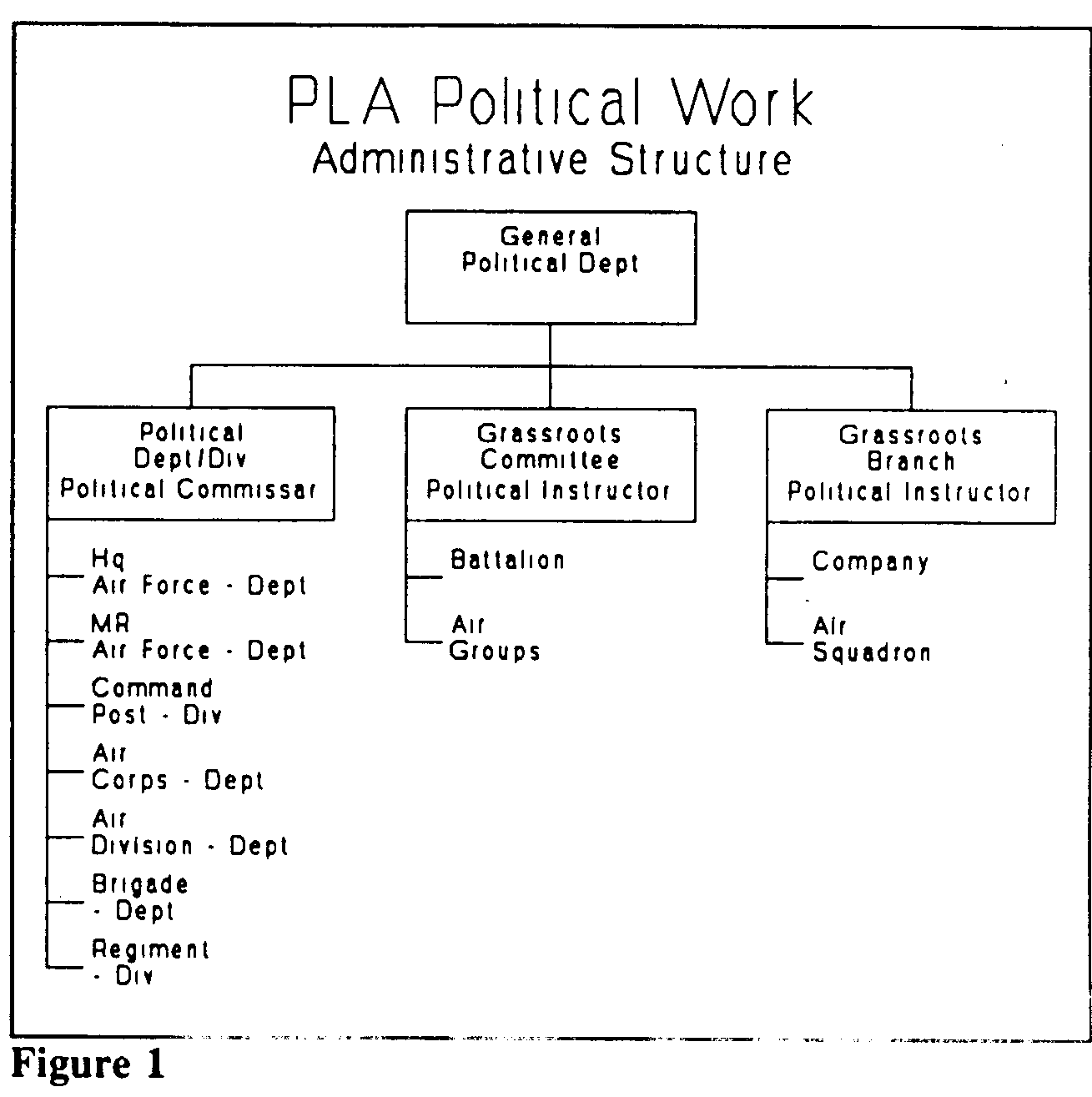SECTION 22
AIR FORCE POLITICAL SYSTEM
AIR FORCE POLITICAL SYSTEM
The PLAAF has three
organizations that accomplish political work: Party Committees (dang
weiyuanhui/dangwei), political commissars (zhengzhi weiyuan/zhengwei), and
Political Departments (zhengzhi bu).
Political work includes political education, personnel issues, and propaganda. HqAF's Discipline Inspection Commission (jilu jiancha weiyuanhui), which
is chaired by the senior deputy political commissar, works directly for the
PLAAF's Party Committee and the Military Commission's Discipline Inspection
Commission. Every MRAF Headquarters also has a Discipline Inspection
Commission. Each of these commissions are responsible
for major disciplinary problems. The political system has about 30,000 people
engaged in political work. The
PARTY COMMITTEES
Major decisions affecting an
Air Force unit require the coordination of the unit's Party Committee, which is
the nucleus of unified leadership. At HqAF, the
political commissar is the secretary (shuji) of the
Air Force Party Committee and the commander is the deputy secretary (fushuji). All four deputy commanders, the two deputy
political commissars, chief of staff, and the three other first level
department directors serve as members of the Air Force Party Committee Standing
Committee (dangwei changwei).
In order to exercise the
Party's absolute leadership over the military, a Party Committee and Standing
Committee are established at each regiment and above. The political commissar
is normally the secretary and the commander is the deputy secretary of the
Party Committee at these units (budui). In addition,
each unit (danwei) or headquarters staff element that
has the Army-equivalent status (zhiwu dengji) of a regiment or above also has a Party Committees.
For example, the Shenyang MRAF Political Department, which is equivalent to an
army (jun), has its own
Party Committee (bu
dangwei). Grassroots Party Committees (jiceng weiyuanhui) are established at each battalion and
equivalent. Grassroots Party Branches (dangde jiceng zhibu) are set up at the
company level. Committee members are called chengvuan
or weiyuan.
The Party Standing Committee
at each level consists of the command staff, which includes the commander,
political commissar, deputy commander(s), deputy political commissar(s), chief
of staff (who is also the director of the Headquarters Department), plus the
directors of the Political, Logistics, and Maintenance elements. The Standing
Committee meets regularly to discuss all major decisions affecting the unit and
its subordinates. As a result, both the military and political officers are
involved in the day-to-day running of the Air Force at all levels.
Although
the command staff meets regularly, the PLAAF does have a division of
responsibilities at each level. If an issue concerns military affairs, then the
military officers or commander will carry out the decision. If the issue
concerns political matters, then the political officers are responsible for
implementing the decision. However, some issues require input from both
parties. For example, the commander at an air regiment determines how many
sorties to fly on a particular day, but the political commissar help determine
who will fly those missions based on political reliability.
The
PLAAF's goal is to eventually have commanders and political commissars who have
worked in both military and political assignments. This is especially valuable
because the political commissar is responsible for carrying out the unit's
operational mission in conjunction with the deputy commanders) when the
commander is absent. For example, the Lanzhou MRAF political commissar, who
took the position in 1990, was previously a deputy commander in the
Since
ranks were re-instituted in 1988, the rank relationship between the
commander and the political commissar has been somewhat obscure, but the
personal relationship has sometimes been forged over many years of working
together. For example, PLAAF Commander Wang Hai is a
three star general (shangjiang) and outranks
Political Commissar Zhu Guang, who is a two star
lieutenant general (zhongjiang). Furthermore,
although they have different ranks, they both have an Army-equivalent
position (zhiwu dengji) of
a Military Region Commander.
Only
with the attrition of older cadres over the next few years, will the rank
relationship among the staff members at all levels, including the commander and
political commissar, be known with certainty. For example, some air division
commanders are colonels, while their deputy commanders are senior colonels.
Although the "normal" rank for the deputy director of an MRAF
Political Department is a senior colonel or colonel, the deputy director of the
Chengdu MRAF in December 1990 was a major general.
POLITICAL COMMISSARS
Political
commissars (zhengwei) are assigned to units (budui and danwei) at and above the
regimental level, while political instructors (zhidaoyuan)
are assigned to units below this level. Political instructors are also assigned
to the PLAAF's flying groups and their maintenance squadrons. Political
commissars and instructors are responsible for the following duties:
-
Teaching the Chinese Communist Party line, policies, and principles
-
Handling personnel issues such as promotion, selection, and transfers, and
coordinating on recruitment and training matters
-
Overseeing public affairs such as cultural, artistic, and athletic work
Political
instructors at the battalion and below receive basic training at the
POLITICAL DEPARTMENTS
The
General Political Department (GPD) is the highest leading body for political
work in the PLA. While divisions and brigades have a Political Department (zhengzhi bu), regiments have a
Political Division (zhengzhi chu).

Within the Political Departmen/Division, there is a director (zhuren), deputy director(s) (fuzhuren), and functional second level departments (bu), divisions (chu), offices (ke), and branches (gu) which are equivalent to those second level elements at HqAF (i.e. Secretariat, Propaganda, Security, Cultural, Cadre/Personnel, etc.) Assistants within the political system are called secretaries (mishu).
|
NEWSLETTER
|
| Join the GlobalSecurity.org mailing list |
|
|
|

